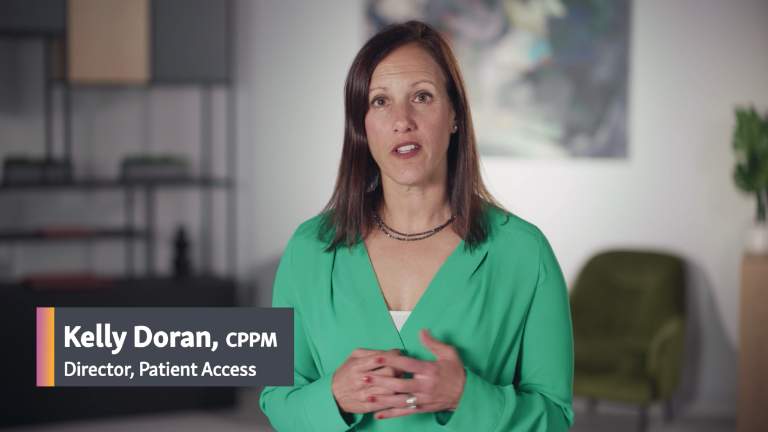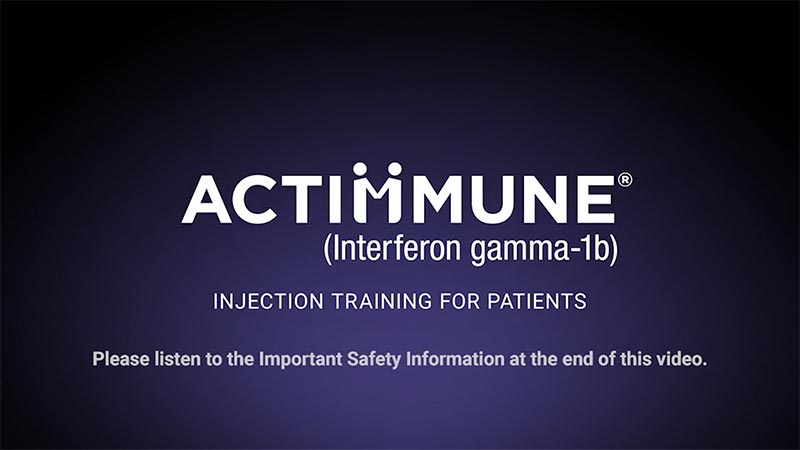Please listen to the Important Safety Information at the end of this video.
Jeannie: I was extremely nervous giving my son the injection the first time. I was afraid I was going to hurt him, I don’t like needles myself and he had been through so much already. But after the nurse educatior showed us how to do it, and I completed that first injection and now it’s part of our routine.
Jeannie/Thaddaeus: Hi, I’m Jeannie, and I’m Thaddaeus and I have been taking ACTIMMUNE® for two years and if I can get comfortable with it, you can too.
Super:
JEANNIE, Caregiver
THADDAEUS, Living with CGD
Jeannie: When you first start ACTIMMUNE®, your doctor or nurse will show you how to inject. If you ever have questions, that’s who you should call first. You should also read the Patient/Caregiver Information that came with your ACTIMMUNE®. Don’t try to inject until you’ve been trained and told you’re good to go.
Let’s get started.
Jeannie: Before we can begin the injection, we need do a few things.
I like to take the vial out of the fridge about 15 minutes beforehand, so it has time to get up to room temperature.
It’s important to always look the vial over. If it’s past the expiration date or if its content looks cloudy, don’t use it. And don’t ever shake the vial.
Super: EXAMINE THE VIAL
- CHECK THE EXPIRATION DATE
- CHECK FOR CLOUDINESS
- DO NOT SHAKE THE VIAL
In addition to your vial of ACTIMMUNE®, you’ll need alcohol swabs or alcohol-soaked cotton balls, and a syringe and needle. Also a Sharps Container, which you’ll need for disposing of the syringe and needle later.
Jeannie: Always wash your hands with soap before measuring your dose of ACTIMMUNE®.
Take the red cap off the vial, then wipe the top with your alcohol swab.
Next, take the syringe out of its package. Leaving on the plastic needle guard, draw air into the syringe by pulling back on the plunger. I pull it back to the mark for the dose of ACTIMMUNE® our doctor told us to take.
Then take off the needle guard, and set it aside for the moment.
Holding the vial upright, carefully stick the needle in through the rubber top and push the plunger down all the way so the air goes into the vial.
Now hold the vial upside down with one hand, and with the other hand, slowly pull the plunger out to the mark for the dose of ACTIMMUNE® your doctor told you to take, drawing the correct amount of medicine into the syringe.
Finally, take the needle out and replace the needle guard.
Jeannie: Now that we’ve measured our dose, we have to select an injection site. It’s important to rotate the site with every injection so that the skin has time to recover.
The usual injection sites are the thighs,…
…the belly,…
…and the upper arms. Our doctor told us to look for a place that’s padded by some fat underneath the skin, which helps reduce any pain. If you select the belly, make sure you inject at least 2 inches away from the belly button.
You have to work together on what works and what doesn’t work. We only do injections in the thighs because he’s not comfortable with the belly or the upper arms.
Now we’re ready to inject ACTIMMUNE®.
Jeannie: First, I sterilize the injection site with an alcohol swab. Then I remove the needle guard as I hold the syringe just like a pencil.
With my other hand, I gently squeeze the skin to be injected between my fingers to form a soft fold. I tell Thaddaeus to relax as much as he can…
…and then I push the needle in with a quick, firm motion at about a 45-degree angle.
Now that the needle is in, I pull back on the plunger just a little to see if blood comes into the syringe. There’s no blood in the syringe, so I’m ready to inject. But if I had seen blood, I would have removed the needle from his skin and tried again at another location.
Slowly inject the ACTIMMUNE® by gently pushing the plunger until the syringe is empty. This should take just a few seconds.
Withdraw the needle quickly. Then apply pressure for a few seconds with a cotton ball or gauze. Then put a bandage on, and that’s it.
Thaddaeus: Now that my injection is done and I’m back in action, we just need to dispose of everything properly.
Jeannie: It’s important to replace the needle guard and toss the needle and syringe in your Sharps Container.
And finally, dispose of any unused ACTIMMUNE® the way your doctor told you to. Now we’re done!
Super: Visit ACTIMMUNE.com/support to explore all the resources and tools available.
Jeannie: Even after your doctor has taken you through the steps, being nervous about injecting is totally normal.
Thaddaeus: But trust me, it gets easier with practice.
At first I was scared of taking my ACTIMMUNE but now I’ve been practicing and it’s easier.
Jeannie: I’m extremely proud of the way Thaddaeus handles this. We’ve come a long way, he’s starting to learn how to do each step. He’s got to own this part of managing his disease.
If you want to review any of these steps again, please refer to the chapters listed on the screen. I hope this video helps you become more comfortable. And if you still have questions, call your doctor.
By the way, the Horizon Support Network will give you a Sharps Container at no cost. Call the number on the screen to reach a program coordinator.
HAVE QUESTIONS?
If your child is enrolled in Horizon By Your side: Call, text, or email your Clinical Nurse Educator (CNE)
HAVE QUESTIONS?
If your child is not enrolled in Horizon By Your Side: Call the CGD Nurse Advocate Call Center at 1 (833) 3-4MYCGD
SAFETY INFORMATION
Voice Over: The most common side effects with ACTIMMUNE are “flu-like” symptoms such as fever, headache, chills, muscle pain, or fatigue, which may decrease in severity as treatment continues. Bedtime administration of ACTIMMUNE may help with some of these symptoms. Acetaminophen may be helpful in preventing fever and headache.
You are encouraged to report negative side effects of prescription drugs to the FDA. Visit www.fda.gov/medwatch, or call 1-800-FDA-1088.
Super: www.fda.gov/medwatch - 1 (800) FDA-1088
Please see the Full Prescribing Information and Important Safety Information available on this website. Please read the Information for Patients/Caregivers and consult your healthcare professional before giving an injection of ACTIMMUNE®.
Occasionally, a problem may develop at an injection site. Call your doctor or nurse if you see a lump, swelling, or bruising that doesn’t go away, or any signs of infection, such as pus, hot skin, or pain that does not go away.
IMPORTANT SAFETY INFORMATION
What is ACTIMMUNE® (Interferon gamma 1-b) used for?
ACTIMMUNE® is part of a drug regimen used to treat Chronic Granulomatous Disease, or CGD. CGD is a genetic disorder, usually diagnosed in childhood, that affects some cells of the immune system and the body’s ability to fight infections effectively. CGD is often treated (though not cured) with antibiotics, antifungals, and ACTIMMUNE.
ACTIMMUNE is also used to slow the worsening of severe, malignant osteopetrosis (SMO). SMO is a genetic disorder that affects normal bone formation and is usually diagnosed in the first few months after birth./
When should I not take ACTIMMUNE?
Don’t use ACTIMMUNE if you are allergic to interferon-gamma, E coli-derived products, or any ingredients contained in the product.
What warnings should I know about ACTIMMUNE?
At high doses, ACTIMMUNE can cause (flu-like) symptoms, which may worsen some pre-existing heart conditions.
ACTIMMUNE may cause decreased mental status, walking disturbances, and dizziness, particularly at very high doses. These symptoms are usually reversible within a few days upon dose reduction or discontinuation of therapy.
Bone marrow function may be suppressed with ACTIMMUNE, and decreased production of cells important to the body may occur. This effect, which can be severe, is usually reversible when the drug is discontinued or the dose is reduced.
Taking ACTIMMUNE may cause reversible changes to your liver function, particularly in patients less than 1 year old. Your doctor should monitor your liver function every 3 months, and monthly in children under 1 year.
In rare cases, ACTIMMUNE can cause severe allergic reactions and/or rash. If you experience a serious reaction to ACTIMMUNE, discontinue it immediately and contact your doctor or seek medical help.
What should I tell my healthcare provider?
Be sure to tell your doctor about all the medications you are taking.
Tell your doctor if you:
- are pregnant or plan to become pregnant or plan to nurse
- have a cardiac condition such as irregular heartbeat, heart failure, or decreased blood flow to your heart
- have a history of seizures or other neurologic disorders
- have, or have had, reduced bone marrow function. Your doctor will monitor these cells with blood tests at the beginning of therapy and at 3-month intervals on ACTIMMUNE therapy
What are the side effects of ACTIMMUNE?
The most common side effects with ACTIMMUNE are “flu-like” symptoms such as fever, headache, chills, muscle pain, or fatigue, which may decrease in severity as treatment continues. Bedtime administration of ACTIMMUNE may help reduce some of these symptoms. Acetaminophen may be helpful in preventing fever and headache.
What other medications might interact with ACTIMMUNE?
Some drugs may interact with ACTIMMUNE to potentially increase the risk of damage to your heart or nervous system, such as certain chemotherapy drugs. Tell your doctor about all other medications you are taking.
Avoid taking ACTIMMUNE at the same time as a vaccination.
You are encouraged to report negative side effects of prescription drugs to the FDA. Visit www.fda.gov/medwatch, or call 1-800-FDA-1088.
The risk information provided here is not comprehensive. To learn more, talk about ACTIMMUNE with your healthcare provider or pharmacist. The FDA-approved product labeling can be found at http://www.ACTIMMUNE.com or 1-866-479-6742.





